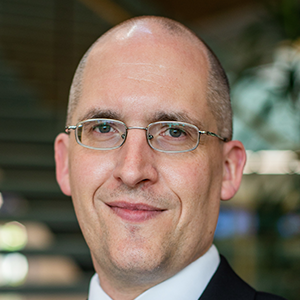Authorship in academia
For many, scientific publication is the end goal for research projects. Publication is the most common way to share your data and project results with the entire scientific community. Yet every research project is at least somewhat collaborative. How are these contributions recognized during publication?
For trainees, this question can sometimes be confusing and stressful, especially if their mentor is not very straightforward with authorship expectations.

To help figure this out, I talked with Nathan Vanderford, an associate professor at the University of Kentucky. Vanderford has published more than 20 papers with trainees during his career, so he has had to navigate the ins and outs of authorship with multiple groups. I find his approach to be good for both mentors and trainees.
How is authorship order decided?
Authorship order typically correlates with how much each person contributed to the publication, with the most work being acknowledged by a first-author status. The definition of "work" will vary between mentors and labs: Some primarily focus on the research and data, while others account for the writing and paper submission process as well.
Vanderford said authorship order is very project-dependent and will vary on a case-by-case basis. Some mentors will specifically track who collected what data, who did what writing, and more to try to objectively figure out the order in which authors should be listed. Other mentors won’t take such a data-driven approach and instead will discuss contributions as a project or paper is developing.
At what point during a project should you discuss authorship?
Every lab and mentor is different — some mentors will discuss authorship during the beginning stages of a project, while others may not discuss the topic until the article is being written. Vanderford takes the former approach.
“When I have a new project, I look for the right person to lead that project and then usually tell them right off the bat that, if the project leads to publication, they will be the lead author as well,” he said.
That doesn’t mean this is always what happens. Vanderford said authorship order can change, and he thinks of authorship as fluid. If another researcher comes in and significantly contributes to the project as a whole, he will suggest co-first authorship for the two project leads. But, above all, he advocates for early and recurring conversations about authorship.
“Being as upfront and transparent as early on as possible is best to avoid any confusion and misunderstandings,” he said. “Anecdotally speaking, people in general don’t like to have these difficult conversations and so they avoid them, and that’s when things can get messy.”
So even if your mentor doesn’t bring up authorship to you, it is worthwhile to ask them about it to understand what will happen down the line during the publication process.
I would say authorship conversations matter equally for smaller or collaborative projects as for the projects you are leading on your own. Understanding if you will or won’t be included as an author from the get-go can help ensure your work is being acknowledged appropriately.

How will I know if I’m included as an author?
If you haven’t been told during the course of a project, you should find out if you’re included as an author before a paper is published. It’s good practice to send out a paper to all authors prior to publication so they can review it and at least acknowledge their name is attached to that body of work. Vanderford starts this process even earlier.
“When a project starts to be written up, I try to put the title page out there as soon as possible so we can start having discussions with everyone individually and as a group to make sure we are OK with the authorship order,” he said.
For him, this system has worked well, and the early discussions give people plenty of time to speak up and tweak authorship as needed.
What if you’re unhappy with the authorship order?
Hopefully most of us can avoid being unhappy with where we are in an authorship order (or, even worse, being left off of a publication), although it does happen. In fact, it happened to me recently: A grad student is finishing up a project from my graduate lab and emailed me a paper prior to submitting it for publication. I was surprised to see my position in the authorship list had changed.
This gets back to Vanderford’s previous point that authorship is fluid and can change as projects develop, but that doesn’t mean you shouldn’t advocate for yourself and your author position if it’s important to you.
If you feel your work isn’t being appropriately reflected in the author list, the first step is to talk to your mentor (or former mentor, or whomever you did the work for). This can give you a better understanding of why the author order is the way it is. Maybe someone contributed more work than you were aware of, or maybe the data you provided was largely removed from the paper. Likewise, it's a chance for you to better explain how you contributed to the paper, perhaps in ways about which the mentor is unaware.
If you’re still unhappy and feel the authorship order is unfair, Vanderford said, there may be more formal steps you can take as well, although they will vary by institution.
“I would recommend (that trainees talk) to someone on their advisory committee, without the (principal investigator) present,” he said. “They could help assess the situation and speak on behalf of the trainee if needed.”
Vanderford also said that this is another reason he stresses the importance of having conversations about contributions and authorship early and that the responsibility to have these conversations relies on both mentors and trainees.
“Trainees need to learn early that it’s critical for them to stand up for themselves and to be their own advocate,” he said. “While there is certainly a power differential (between trainee and mentor) that can make these conversations hard, trainees need to be able to have critical conversations with their mentor.”
Enjoy reading ASBMB Today?
Become a member to receive the print edition four times a year and the digital edition monthly.
Learn moreFeatured jobs
from the ASBMB career center
Get the latest from ASBMB Today
Enter your email address, and we’ll send you a weekly email with recent articles, interviews and more.
Latest in Careers
Careers highlights or most popular articles

Upcoming opportunities
ASBMB's PROLAB award helps graduate students and postdoctoral fellows spend up to six months in U.S. or Canadian labs.

From humble beginnings to unlocking lysosomal secrets
Monther Abu–Remaileh will receive the ASBMB’s 2026 Walter A. Shaw Young Investigator Award in Lipid Research at the ASBMB Annual Meeting, March 7-10 in Washington, D.C.

Chemistry meets biology to thwart parasites
Margaret Phillips will receive the Alice and C. C. Wang Award in Molecular Parasitology at the ASBMB Annual Meeting, March 7-10 in Washington, D.C.

Decoding how bacteria flip host’s molecular switches
Kim Orth will receive the Earl and Thressa Stadtman Distinguished Scientists Award at the ASBMB Annual Meeting, March 7–10, just outside of Washington, D.C.

Defining JNKs: Targets for drug discovery
Roger Davis will receive the Bert and Natalie Vallee Award in Biomedical Science at the ASBMB Annual Meeting, March 7–10, just outside of Washington, D.C.

Upcoming opportunities
No matter where you are in your career and what future path you aspire to, everyone needs leadership skills. Join ASBMB for practical strategies for building and practicing leadership skills.

